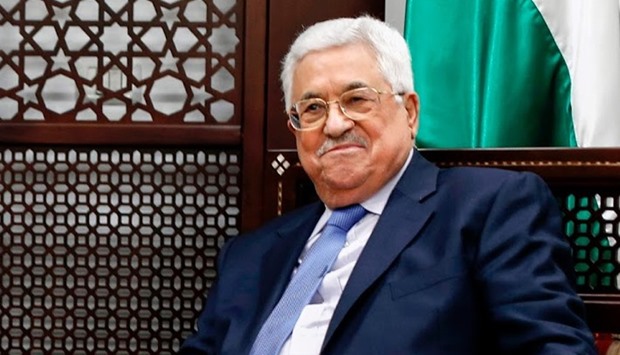Palestinian President Mahmoud Abbas will seek EU support in Brussels on Monday amid bitter acrimony with the United States, but he looks unlikely to get much the in way of concrete commitments.
In an interview with AFP on Sunday in Brussels, Palestinian foreign minister Riad al-Malki said Abbas would urge the European Union to officially recognise the state of Palestine ‘as a way to respond’ to US President Donald Trump's decision to recognise Jerusalem as the Israeli capital.
Abbas, who last week denounced US President Donald Trump's peace efforts as the ‘slap of the century’, will also ‘reiterate his commitment to the peace process’ in the Middle East, Malki said in an interview with AFP in Brussels.
The 82-year-old Abbas will meet EU diplomatic chief Federica Mogherini and the bloc's 28 foreign ministers on the sidelines of their monthly meeting, after Israeli Prime Minister Benjamin Netanyahu made a similar trip last month.
‘Since Trump's decision has altered the rules of the game, he (Abbas) expects the European foreign ministers to come forward and collectively recognise the state of Palestine as a way to respond back to Trump's decision,’ Malki said.
- No recognition likely -
But diplomats and officials in Brussels say recognition for Palestine is not on the cards on Monday -- the EU leaves recognition in the hands of individual members -- and the best Abbas can hope for is progress towards an ‘association agreement’ with the bloc.
Some countries, notably France, are understood to be keen to give Abbas something concrete to take away.
But others are more cautious and a senior EU official said for now launching talks on an association remained ‘something we should aim towards’.
A formal agreement would bring certain obligations the Palestinian Authority would have to fulfill, the senior official said, and currently it ‘does not have that full sovereign capacity’.
Malki told AFP that while the Palestinian Authority was ‘very serious’ about an association agreement, they also expected to be formally recognised as a state.
‘One does not replace the other. Absolutely not,’ he said.
Abbas will urge the EU to take on a bigger role in trying to move peace efforts forward, Malki said, declaring American ‘exclusivity and monopoly’ in the process is over and a new ‘multilateral’ framework was needed.
Abbas's mission to Brussels comes as US Vice President Mike Pence visits Israel during a tour of the Middle East with Arab anger still smouldering over Washington's declaration on Jerusalem.
‘It is an important coincidence. It will give a picture of a balance between the European Union and the United States in the area -- Abu Mazen with the Europeans and Pence with the Americans. That is an important image for Abu Mazen,’ analyst Jihad Harb, of the Palestinian Center for Policy and Survey Research, told AFP.
The Palestinian leadership, furious over the Jerusalem decision, has said it will not accept the Trump administration as a mediator in peace talks with Israel and wants an internationally-led process.
‘The Palestinians are looking to move away from a US-led process to a more a multilateral process and there does appear to be a greater willingness on the EU side to look at such a process,’ Hugh Lovatt, Israel Palestine Project Coordinator at the European Council on Foreign Relations, said.

